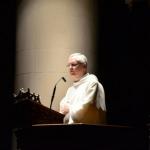This is my second homily for this weekend. My homily for the RCIA scrutiny is here.
+
In the tiny Latin American country of Paraguay, there is a town literally built on a garbage dump, named Cateura. Poverty and filth are everywhere.
Three years ago, Bob Simon of “60 Minutes” went there and described trash as the city’s only crop—a crop, he said, whose harvest lasts 12 months out of the year. People known as the Trash Pickers sift through the garbage, scrounging for anything they can sell—paper, pieces of plastic, cardboard.
But one small band of trash pickers has done something amazing.
They have found a way to turn trash into musical instruments: violins made from oven trays, cellos crafted from oil barrels, trumpets are made from drain pipes. All these pieces are brought together and used by children, who have formed an orchestra of their own, the Recycled Orchestra of Catuera.
Their story was told in a documentary called “Landfill Harmonic.”
When these kids play, the result is—literally—music to your ears.
Everybody wins: local craftsmen earn a modest living turning trash into instruments. Children learn how to make music. The poorest of the poor receive dignity and inspiration. And a corner of the world known for poverty and despair is able to become, in some small way, a place of beauty.
One of the parents says: “People used to humiliate us and call us trash pickers. But I feel this is a reward from God. That our children who came from this place can play beautiful music in this way.”
Some look at what others throw away and see trash.
Others look at it and see possibility.
It is happening in Paraguay.
And I think it happened 2,000 years ago outside the temple, when they Pharisees brought to Jesus a woman caught in adultery.
The stakes were high. The Pharisees were intent on killing her. They wanted to stone her to death. To the people who dragged her before Jesus, this woman had no worth. No value. No dignity. Her life was expendable. She was a sinner. She was, to them, garbage.
But Jesus saw something more.
He saw someone worth saving—a woman who might be, in so many ways, an instrument.
If we have learned nothing else this Lent, we should have learned this: God never tires of giving us another chance.
The gospels the last few weeks have told us again and again stories of second chances. God gives more time to the fig tree, another chance to the prodigal son, a fresh start to a woman caught in adultery.
The recurring theme of Lent is one of restoration and renewal.
And—significantly—mercy.
This is our great source of consolation and hope: God does not give up on us, even if the world does. Even if we feel we are scarred forever by our sins. Even if we feel we are banged up pieces of tin that should be sold for scrap, God sees a way to take that tin, and shape it, and make from it a work of art.
Looked at another way: We may feel our lives are little more than dull noise.
But God hears something else.
He hears music.
He hears, even, a symphony.
We dwell in possibility. And we owe it, so much, to God’s mercy.
In these final days of Lent, the scripture calls out to us in a very particular way to be open to God’s mercy. The readings we’ve been encountering from Luke have driven that message home—it’s one reason why the Holy Father elected to make this a Year of Mercy. The readings challenge us to look at ourselves, and others, differently—to see not what is, but what can be.
F. Scott Fitzgerald famously said there are no second acts in American life.
Well, by the grace of God, there is always a second act. Or a third. Or a fourth. Look at the prodigal son. Look at the woman caught in adultery.
The first act doesn’t have to define us. It doesn’t have to be the end of the story.
And this is our moment to change the narrative.
Next Monday, the Monday of Holy Week, March 21, the greater New York area will once again be hosting Reconciliation Monday in the Diocese of Brooklyn, the Archdiocese of New York and the Diocese of Rockville Centre. At hundreds of churches, the light will be on, the door will be open. A priest will be waiting. It is an opportunity to go to confession, to begin again.
Seize this moment. Start writing that next act.
A few moments of your time can actually change your life.
As one who has been there, and avoided the confessional for years, let me tell you: you will feel a lot better.
The God who gave us the Eucharist is waiting to give us the grace to make our lives whole.
Take a lesson from the children of Cateura. Damaged goods are still good.
No matter what we may think…no matter what the world may tell us…God doesn’t see us as junk—something to be thrown away because of mistakes we have made or sins we have committed.
He sees us as instruments, waiting to be tuned, waiting to make music.
Uplifted by his grace, powered by his mercy…we can make beautiful music.
Photo: L’Osservatore Romano












